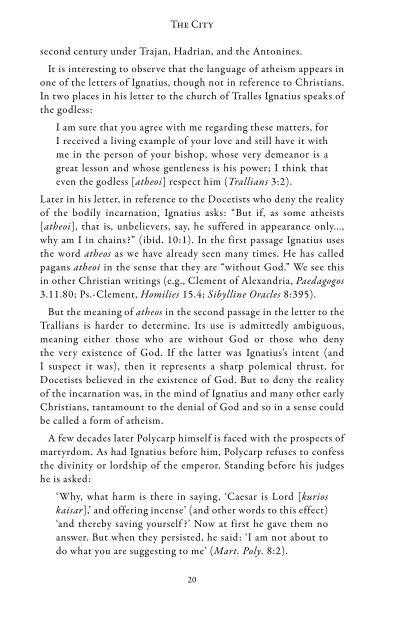THE CITY
h6c7p5d
h6c7p5d
Create successful ePaper yourself
Turn your PDF publications into a flip-book with our unique Google optimized e-Paper software.
The City<br />
second century under Trajan, Hadrian, and the Antonines.<br />
It is interesting to observe that the language of atheism appears in<br />
one of the letters of Ignatius, though not in reference to Christians.<br />
In two places in his letter to the church of Tralles Ignatius speaks of<br />
the godless:<br />
I am sure that you agree with me regarding these matters, for<br />
I received a living example of your love and still have it with<br />
me in the person of your bishop, whose very demeanor is a<br />
great lesson and whose gentleness is his power; I think that<br />
even the godless [atheoi] respect him (Trallians 3:2).<br />
Later in his letter, in reference to the Docetists who deny the reality<br />
of the bodily incarnation, Ignatius asks: “But if, as some atheists<br />
[atheoi], that is, unbelievers, say, he suffered in appearance only...,<br />
why am I in chains?” (ibid. 10:1). In the first passage Ignatius uses<br />
the word atheos as we have already seen many times. He has called<br />
pagans atheoi in the sense that they are “without God.” We see this<br />
in other Christian writings (e.g., Clement of Alexandria, Paedagogos<br />
3.11.80; Ps.-Clement, Homilies 15.4; Sibylline Oracles 8:395).<br />
But the meaning of atheos in the second passage in the letter to the<br />
Trallians is harder to determine. Its use is admittedly ambiguous,<br />
meaning either those who are without God or those who deny<br />
the very existence of God. If the latter was Ignatius’s intent (and<br />
I suspect it was), then it represents a sharp polemical thrust, for<br />
Docetists believed in the existence of God. But to deny the reality<br />
of the incarnation was, in the mind of Ignatius and many other early<br />
Christians, tantamount to the denial of God and so in a sense could<br />
be called a form of atheism.<br />
A few decades later Polycarp himself is faced with the prospects of<br />
martyrdom. As had Ignatius before him, Polycarp refuses to confess<br />
the divinity or lordship of the emperor. Standing before his judges<br />
he is asked:<br />
‘Why, what harm is there in saying, ‘Caesar is Lord [kurios<br />
kaisar],’ and offering incense’ (and other words to this effect)<br />
‘and thereby saving yourself ?’ Now at first he gave them no<br />
answer. But when they persisted, he said: ‘I am not about to<br />
do what you are suggesting to me’ (Mart. Poly. 8:2).<br />
20


